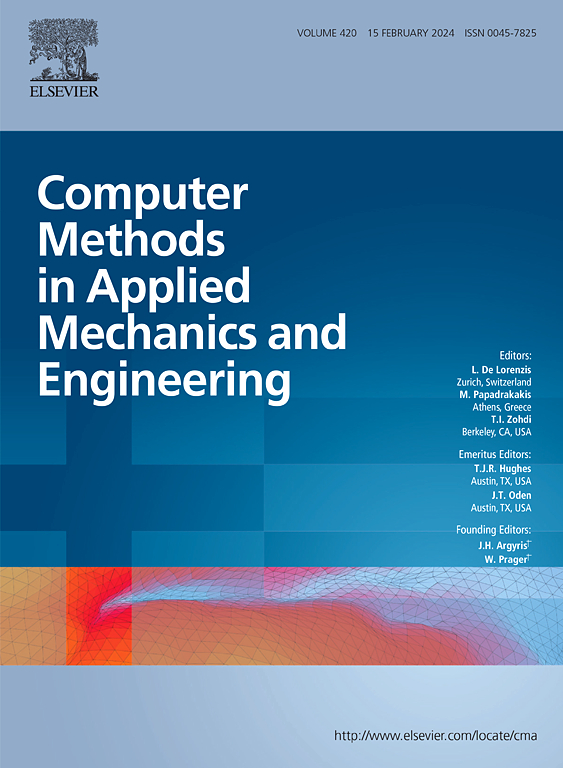用于模拟压力驱动型断裂的基于浮动节点的新要素配方
IF 6.9
1区 工程技术
Q1 ENGINEERING, MULTIDISCIPLINARY
Computer Methods in Applied Mechanics and Engineering
Pub Date : 2024-10-30
DOI:10.1016/j.cma.2024.117482
引用次数: 0
摘要
用有限元法(FEM)模拟压力驱动断裂时,在表示新形成的复杂损伤面及其同时产生的裂纹面加载时会遇到很大困难。当涉及额外的物理因素时,也需要应用这种加载,例如在水力压裂中,需要考虑损伤内部的流体物理因素。本文介绍了一种新的基于有限元的实用数值框架,该框架可在压力驱动型断裂形成时对其进行建模,而无需重塑。通过元素域的物理不连续性的确切位置可以在数值模型中表示出来。该数值框架可作为用户定义的元素实施,并可集成到任何有限元软件包中。制定的新要素(称为压力要素)能够以自适应的方式在裂缝表面施加压力和相关力。利用文献中的相关实例对该元素进行了验证。该框架还可配置为多物理场问题,其中裂纹面加载由附加物理场决定。然后,该元素公式可扩展用于涉及流固相互作用的多物理场问题。随着裂缝的扩展,该公式可提供多物理场自适应耦合的能力。该元素使用不同的求解程序(迭代和同步)成功模拟了文献中的一个测试案例。该元素还用于模拟不同压力容器问题中的故障,以证明其在结构应用中的潜在用途。开发了一种新的更高尺度容器元素,可在元素级表示复合容器系统的不同尺寸、分区和失效状态。对涉及大量受压裂缝和分层以及它们之间相互作用的复合材料容器失效进行了建模,并预测了不同容器系统的爆破压力。所提出的数值框架可用于设计对可持续推进技术至关重要的更耐损伤容器。本文章由计算机程序翻译,如有差异,请以英文原文为准。
A new floating node-based element formulation for modelling pressure-driven fracture
When simulating pressure-driven fracture with the Finite Element Method (FEM), significant difficulties can arise upon representing newly formed complex damage surfaces and their concurrent crack face loading. Application of this loading can also be required when additional physics is involved as in the case of hydraulic fracture where fluid physics inside a damage need to be considered. This paper presents a new Finite Element based practical numerical framework which can model pressure-driven fractures as they form on-the-fly without remeshing. The exact location of physical discontinuities passing through the element domain can be represented in the numerical model. The numerical framework can be implemented as a user-defined element and can be integrated into any FE package. A new element (called pressure element) is formulated with the capability to apply pressure and associated forces onto the crack surfaces in an adaptive manner. This element is verified using relevant examples from literature. The framework can also be configured for multi-physics problems where crack face loading is dictated by an additional physics. The element formulation is then extended for multi-physics problems involving fluid–solid interaction. The formulation provides the capability for multi-physics coupling adaptively as the crack propagates. The element is used to successfully simulate a test case from literature using different solution procedures (iterative and simultaneous). This element is also used to model failure in different pressure vessel problems to demonstrate its potential use in structural applications. A new higher-scale vessel element is developed which can represent different size, partitioning and failure states of composite vessel systems at element level. Composite vessel failure involving high number of pressurized cracks and delaminations as well as their interaction is modelled, and burst pressures are predicted for different vessel systems. The proposed numerical framework can be used towards designing more damage-tolerant vessels critical for the sustainable propulsion technologies.
求助全文
通过发布文献求助,成功后即可免费获取论文全文。
去求助
来源期刊
CiteScore
12.70
自引率
15.30%
发文量
719
审稿时长
44 days
期刊介绍:
Computer Methods in Applied Mechanics and Engineering stands as a cornerstone in the realm of computational science and engineering. With a history spanning over five decades, the journal has been a key platform for disseminating papers on advanced mathematical modeling and numerical solutions. Interdisciplinary in nature, these contributions encompass mechanics, mathematics, computer science, and various scientific disciplines. The journal welcomes a broad range of computational methods addressing the simulation, analysis, and design of complex physical problems, making it a vital resource for researchers in the field.

 求助内容:
求助内容: 应助结果提醒方式:
应助结果提醒方式:


